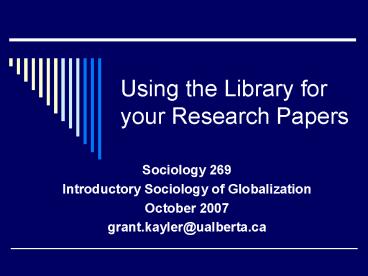Using the Library for your Research Papers - PowerPoint PPT Presentation
1 / 21
Title:
Using the Library for your Research Papers
Description:
One of the biggest library systems in Canada - over 6 million print volumes plus ... Crawford, Gerry, and Victoria K. Gosling. 2004. ... – PowerPoint PPT presentation
Number of Views:60
Avg rating:3.0/5.0
Title: Using the Library for your Research Papers
1
Using the Library for your Research Papers
- Sociology 269
- Introductory Sociology of Globalization
- October 2007
- grant.kayler_at_ualberta.ca
2
Welcome to the UofA Libraries
- One of the biggest library systems in Canada -
over 6 million print volumes plus abundant
electronic full text material - Most sociology materials in print form will be in
RUTHERFORD LIBRARY which houses the social
sciences humanities collection, but you may
find materials in other libraries
3
Some things to remember
- UofA Library is member of the NEOS Library
Consortium - Catalogue gives access to materials we own plus
materials in the other NEOS libraries - Items from BARD other NEOS Libraries must be
requested and take time to get here - Look for books in the Catalogue, look for
articles in a database - Databases include things the Library doesnt own
4
Operating Essentials
- CCID PASSWORD
- Authentication for web access and Library
databases from Library PAC stations, computing
labs, your laptop, home, etc. - OneCard (bar code number and PIN)
- Library Card for circulation services, e.g.
borrowing/renewing, placing holds/requests, my
account tracking, etc. - photocopy/printing card (add to card)
- UofA E-mail account
- notices from the library
5
Finding materials where to start
- www.library.ualberta.ca
- Information on library hours, services, getting
help (Ask Us), etc. - Many different kinds of guides finding materials
by subject, research and writing guides, citation
guides, guides on using applications like
Refworks, etc. - Lets look at Sociology on the webpage
6
Steps in your research process
- Analyze your topic
- Break it into concepts/keywords
- Search by subject or keywords
- Keep track of your references, e.g using Refworks
- Read, reflect, write
7
How to searchsome tips
- Narrow search using AND between concepts
- Globalization and homelessness
- Use OR between synonyms or similar concepts
- Environment or ecology or pollution
8
More tips
- Phrase searching
- Environmental degradation
- Sometimes environmental degradation
- Truncation
- global global, globalization, globalism, etc.
(symbol varies, could be ! or ?
9
Searching Tipsmore complex
- Nesting combine and and or in a single
search, e.g.(environment or pollut) and (oil
or petroleum or gas) and Nigeria - Nesting and Proximity terms near each other,
e.g.(environment or pollut) within 10 (oil or
petroleum or gas) within 10 Nigeria (may also be
N10) check tips/help to know what symbol to use
10
Dont forget print materials - books!
- Book citation
- Rainwater, Lee, and Timothy M. Smeeding. 2003.
The poor kids in a rich country America's
children in comparative perspective. New York
Russell Sage. - search Library Catalogue by keyword and/or
subject heading - New books listing on Sociology website
11
Dont forget print materials - articles
- When you find an article citation, e.g.
- Crawford, Gerry, and Victoria K. Gosling. 2004.
The Myth of the 'Puck Bunny' Female Fans and
Men's Ice Hockey. Sociology, 38, 3 (July),
477-493. - Get It button will take you to
catalogue listing of print source as well as to
an online full text version if we have it
Look up periodical title in the catalogue to get
call number (article title wont work)
12
DATABASES
- Citation or citation abstract only
- e.g. Sociological Abstracts, Social Science
Citation Index - Get It links to the full text
if available in another database, or to print
sources, e.g. the Libraries Catalogue,
Interlibrary Loan, etc. - Full-text databases (pdf or html)
- Databases that contain the full-text of some or
all of the articles, e.g. SocINDEX with Full
Text, Sociological Collection, SAGE Full Text,
Social Sciences Full Text
13
Scholarly Literature
- Written by experts in the field, credentials
given, usually associated with a postsecondary
institution or research institute - Includes bibliography of references on which the
content is based different from popular
magazines or trade literature - Examples journal articles, books, conference
proceedings/reports, encyclopedias dictionaries
14
Scholarly / Peer reviewed
- Process of reviewing an author's scholarly
work, research, or ideas by others who are
experts in the same field editorial boards,
blind review process - Some databases let you limit your search to
scholarly/peer reviewed journals, e.g.
Sociological Abstracts, SocINDEX with Full Text,
Sociological Collection, Social Sciences Full
Text, CBCA - Ulrichs International Periodical Directory (a
database) can be used to determine if a journal
is scholarly/peer reviewed
15
(No Transcript)
16
(No Transcript)
17
(No Transcript)
18
(No Transcript)
19
(No Transcript)
20
- Web-based citation management, access from
anywhere - Create database of references you build as you go
(e.g. import directly from database) - organize into individual folders for specific
assignments, etc. - Pull references from database/folders to create
bibliography for specific assignments, in proper
format (APA, Chicago, MLA, etc.) - Insert in-text references from folder/database as
you write your paper
21
(No Transcript)

